Charbonneau trainees awarded in 2024 CIHR Graduate Scholarship Competition
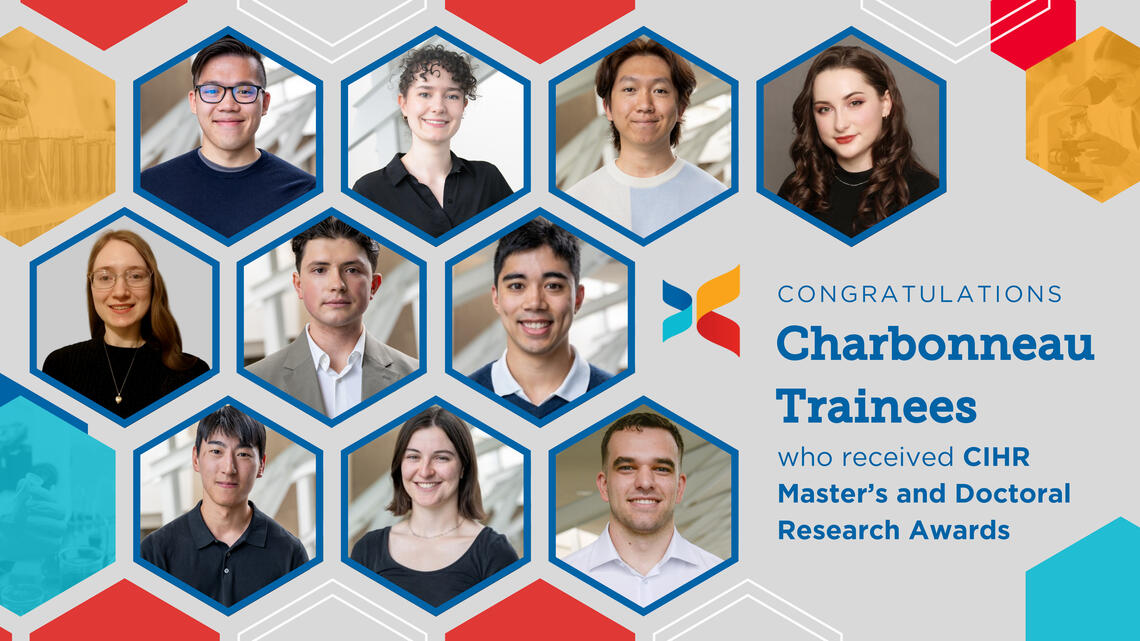
Congratulations to our Charbonneau trainees who were awarded Canadian Institutes of Health Research (CIHR) Awards in the 2024 Canada Graduate Scholarships competition! The impactful and innovative work of these Master's and PhD students are a testament to the hard work, dedication, and talent they bring to our Institute as the next generation of cancer researchers. With the funds granted through these awards, these trainees are encouraged to continue their projects that bring promise to new and effective cancer research.
Doctoral Research Awards
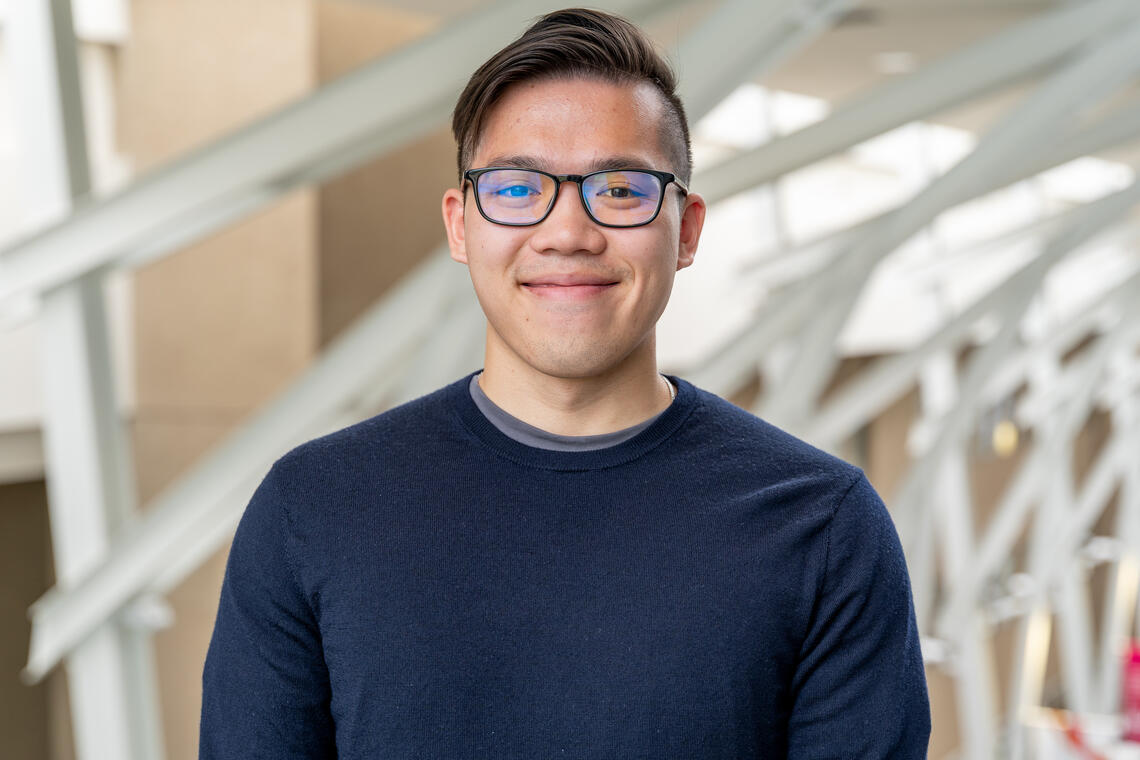
Julian Chua
PhD Student
Supervisor: Dr. Arshad Ayyaz
Using Single-Cell Genomics to Discover Therapeutic Resistance Mechanisms in Human Colorectal Cancer
Every year, 25,200 Canadians are diagnosed with colorectal cancer, and 9,400 die from it, making it a major cause of cancer deaths in Canada. This type of cancer becomes particularly dangerous when it spreads from the colon to other vital organs like the lungs and liver. Unfortunately, traditional treatments such as chemotherapy and radiation therapy are often ineffective against advanced cancer stages, with only about 15% of patients living longer than five years. Immunotherapy, which enhances our own immune system's ability to fight cancer, has been a game-changer in treating skin cancers and shows potential for treating colorectal cancer as well. However, it does not work for over 80% of colorectal cancer patients. In collaboration with clinical partners at Calgary's Foothills Hospital, I gained access to primary human colorectal cancer samples. I have established several tissue cultures using these human patients' cancerous tissues and followed up with detailed genomic exploration at the single-cell level. My efforts so far have led to the discovery of different cancer stem cells that associated with varying levels of resistance to treatments like chemotherapy, radiation therapy, and immunotherapy, and these cells seem to be ultimately responsible for unfavorable clinical outcomes. Moving forward, my next goal is to understand the specific roles these cancer cells play and the mechanisms that determine their behavior and impact, particularly their role in resisting immunotherapy. I aim to identify how these cells interact with the immune system to resist treatments. By working alongside researchers, clinicians, and colorectal cancer patients and their families, I hope to confirm my findings in real-world settings and possibly pinpoint new genes that could be targeted to enhance treatment efficacy. The results obtained from my project promise to identify new ways of treating colorectal cancer, potentially increasing patient survival.
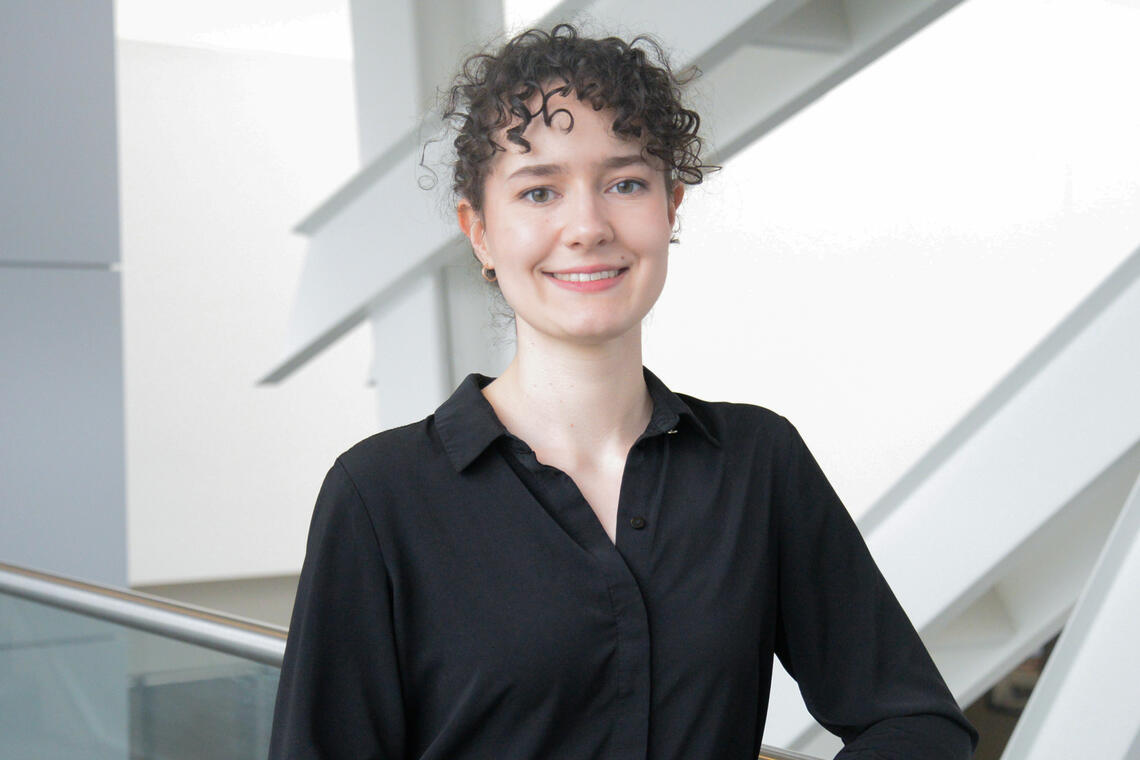
Megan Kinzel
PhD Student
Supervisors: Dr. Nicolas Jacquelot, Dr. Aru Narendran (co-supervisor)
Breast cancer is the most common cancer affecting women in Canada and is the second leading cause of death from cancer in Canadian women. This translates into one Canadian woman succumbing to this disease every 90 minutes. In recent years, advances to cancer treatment have been made with immunotherapies using effector T cells, a type of immune cell. The ability to genetically manipulate effector T cells have made them powerful killers of tumour cells. However, only a fraction of breast cancer patients have benefited from these treatments. In breast cancer, local immunosuppressive mechanisms and the limited capacity of T cells to infiltrate breast cancer limit the effector T cells' ability to reach their targets and eliminate tumour cells. Consequently, many patients suffer from untreatable relapses and have exhausted their treatment options. Thus, alternative targets and treatments that give patients a second chance to eradicate cancer are urgently needed. Our research has revealed that type 2 innate lymphoid cells (ILC2s), another type of immune cell, have the potential to counteract the tumour's immunosuppressive mechanisms and improve the recruitment and functions of effector T cells to eradicate breast tumours. Here, we propose to engineer ILC2s to further increase their capacity to enhance T cell-based treatment efficacy in breast cancer. Specifically, this project seeks to i) use cutting-edge genome editing tools to genetically engineer ILC2s and verify the successful engineering and the functions of these engineered ILC2s in cell culture, and ii) evaluate the ability of these engineered ILC2s to promote T cell immunotherapy-driven tumour killing in preclinical models. Collectively, this innovative approach has the potential to boost T cell-based treatment efficacy for breast cancer, improving breast cancer patient outcomes.
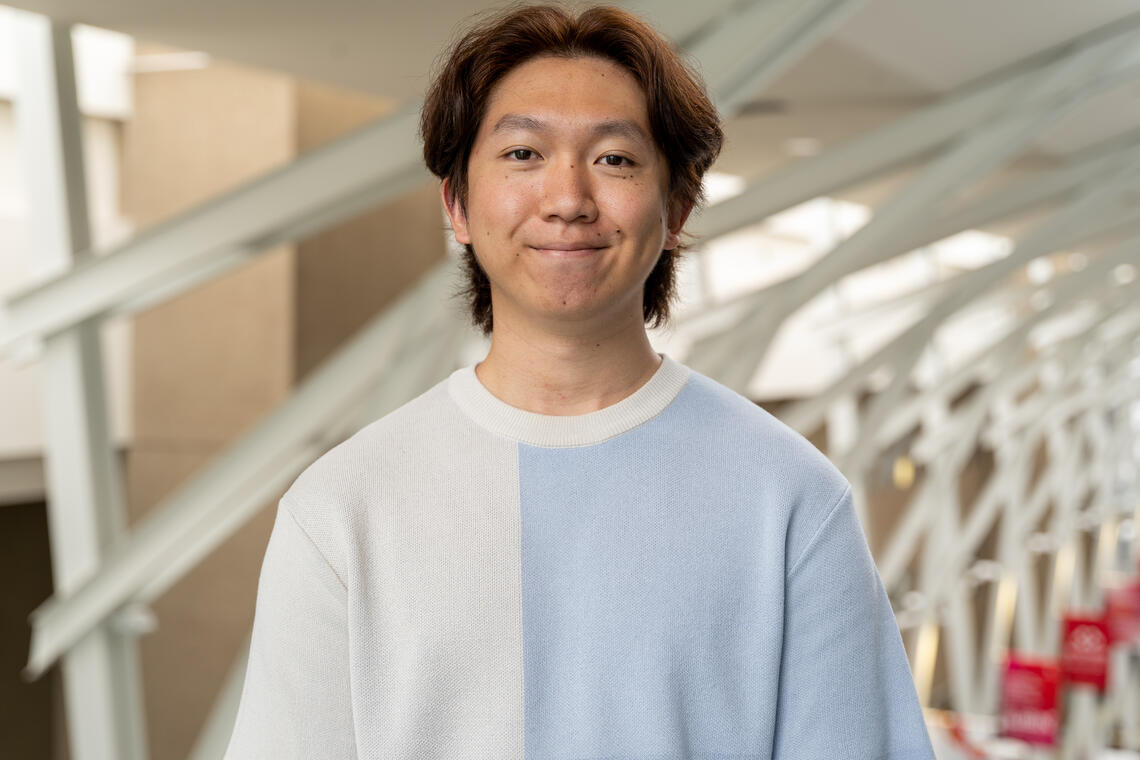
Hobin Seo
PhD Student
Supervisor: Dr. Nicolas Jacquelot, Dr. Douglas Mahoney (co-supervisor)
Investigating the role and function of type 2 innate lymphoid cells during PD-1 blockade
Our immune system is comprised of a diverse network of white blood cells. Within this network, specialised populations such as T cells are employed to fight infection and cancer. T cells carry what are known as immune checkpoint proteins, natural brakes that dampen their capacity to eliminate pathogens and tumours. PD-1 is one such protein present on the surface of T cells, suppressing their activity. Using drugs to block PD-1 restores the ability of the patient's own T cells to kill cancer cells. Although efficient in a variety of cancers, many patients unfortunately do not respond to these treatments. Our recent work suggests that in addition to T cells, a rare white blood cell population called type 2 innate lymphoid cells (ILC2s) carry PD-1 on their surface. Interestingly, the function of ILC2s is also dampened by PD-1. Despite their relatively low abundance compared to T cells, ILC2s provide crucial signals that shape the immune response in their respective environments. We believe that ILC2s may be important communicators, providing anti-tumour signals to other white blood cells in the tumour environment during PD-1 blockade therapy. Building on our foundation, my project will investigate the role and function of ILC2s during PD-1 blockade. By studying animal models, I will examine how the blockade of PD-1 impacts the function of ILC2s in tumours, and determine whether ILC2s contribute to overall anti-tumour responses and treatment efficacy. This project will pave the way for future studies exploring the potential of ILC2s in novel precision cancer medicines. Ultimately, my goal is to harmonise the intricate mechanisms of different white blood cells in our body, to ensure that we have better ways to improve patient outcomes and the lives of people in Canada.
Master's Awards
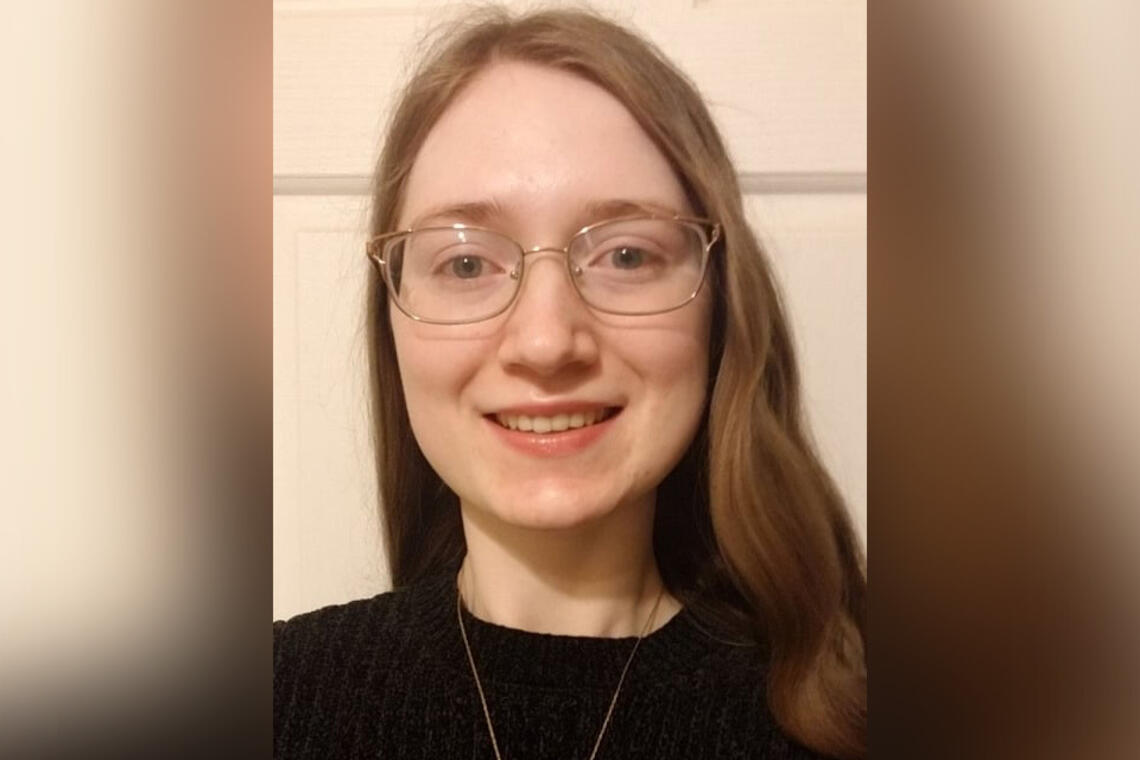
Geneece Gilbert
MSc Student
Supervisor: Dr. Sorana Morrissy
Enhancing Solid Tumor Immunotherapy: TCR-pMHC Interactions in CAR T-cells
Our study aims to enhance immunotherapy strategies for solid tumors by exploring the role of TCR-pMHC interactions across different therapeutic modalities, including Chimeric Antigen Receptor (CAR) T-cells and Immune Checkpoint Inhibitors (ICIs). While CAR T-cells directly target tumor antigens via synthetic receptors, ICIs and cancer vaccines rely on TCR-mediated recognition of tumor-specific neoantigens presented by the major histocompatibility complex (pMHC). Findings from clinical trials, including our recent first-in-person testing of a novel CAR T-cell therapy (GCAR1) for alveolar soft-part sarcoma, suggest that CAR T-cell therapy may also activate endogenous tumor-reactive T-cells, highlighting potential synergy between CAR T-cell activity and endogenous TCR-pMHC responses. This research will focus on identifying tumor-specific antigen repertoires, evaluating their MHC binding, and characterizing pMHC-specific T-cells in patients with poor-prognosis solid tumors. Leveraging unique resources developed in the context of ICI treatments and in our ongoing GCAR1 CAR T-cell trial, including patient blood samples collected serially throughout treatment, and access to GCAR1 clinical products, we will use genomic, transcriptomic, and immunopeptidomic analyses to validate neoantigen predictions and assess TCR engagement in peripheral blood, and when applicable, on CAR-positive and negative GCAR1 T-cells. This strategy will delineate the role of endogenous immunity in CAR T-cell therapies, providing deeper insight into opportunities for rational combinations of CAR T-cell therapies with ICIs, and/or cancer vaccine approaches.
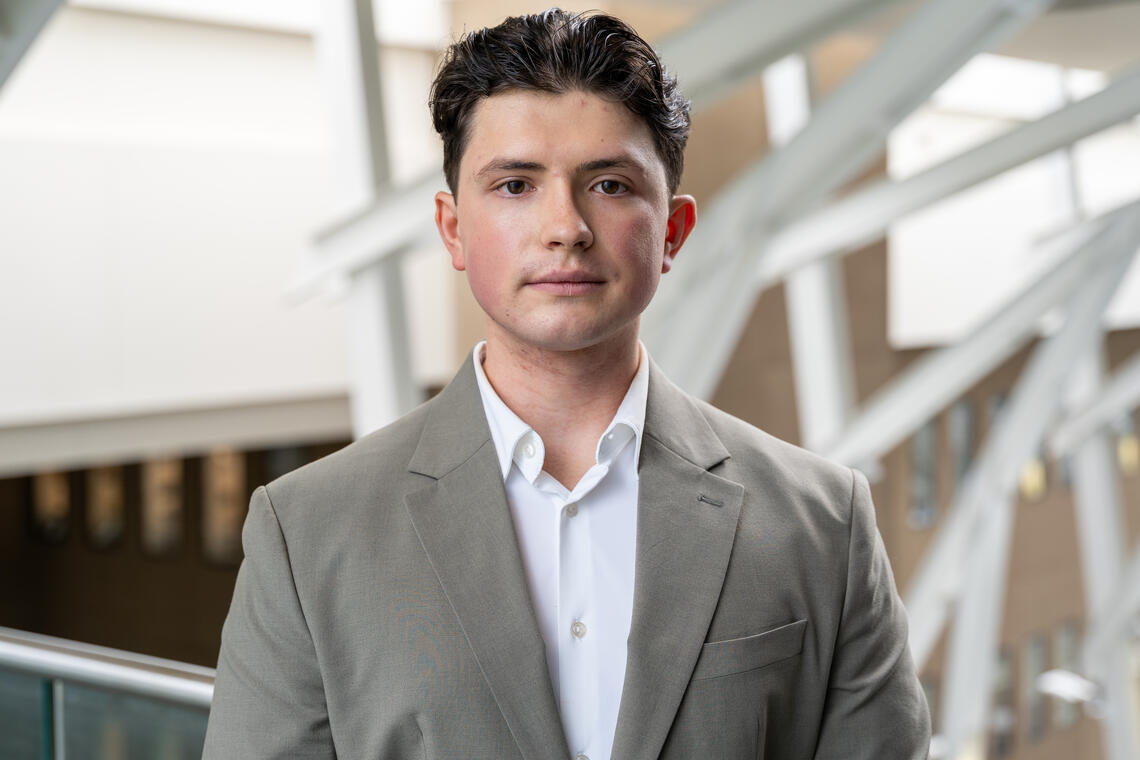
Alex Iwasyk
MSc Student
Supervisor: Dr. Joe Kendal
Background: Evaluating outcomes in musculoskeletal oncology surgery is difficult due to disease heterogeneity, surgical complexity, and variations in techniques. Patient-reported outcome measures are crucial for patient-centered care but have limitations in this field. PROMIS (Patient-Reported Outcome Measure Information System) offers a broad assessment of physical, mental, and social wellbeing but lacks validation for these oncology patients. Investigating PROMIS with mobility metrics will provide a deeper understanding of patient recovery and quality of life. We propose validating ACTIVATION (Activity Capture To Investigate Voluntary Activity in Oncology and Normal Populations), a smartphone app that remotely collects PROMIS scores and mobility data.
Specific Aims:
- Develop a university-compliant app for remote collection of PROMIS and mobility metrics in orthopedic patients.
- Pilot and validate the app in metastatic bone disease (MBD) patients, focusing on compliance, usability, and reliability.
- Analyse PROMIS data in MBD patients, conduct power analysis for future studies, and compare PROMIS to traditional metrics.
Methodology: The ACTIVATION app, developed in-house, is ready for beta testing. A prospective cohort of 30 adult MBD patients undergoing lower extremity surgery will participate. PROMIS questionnaires will be administered via the app preoperatively and 2-weeks, 6-weeks, 3-months, and 6-months postoperatively. Functional recovery metrics, including step count, stairs climbed, and gait parameters, will also be collected. The study will evaluate feasibility, usability, and patient engagement.
Expected Outcomes: Develop insights into recovery trajectories and validate PROMIS for MBD patients. Enhanced accessibility and standardized outcome tracking.
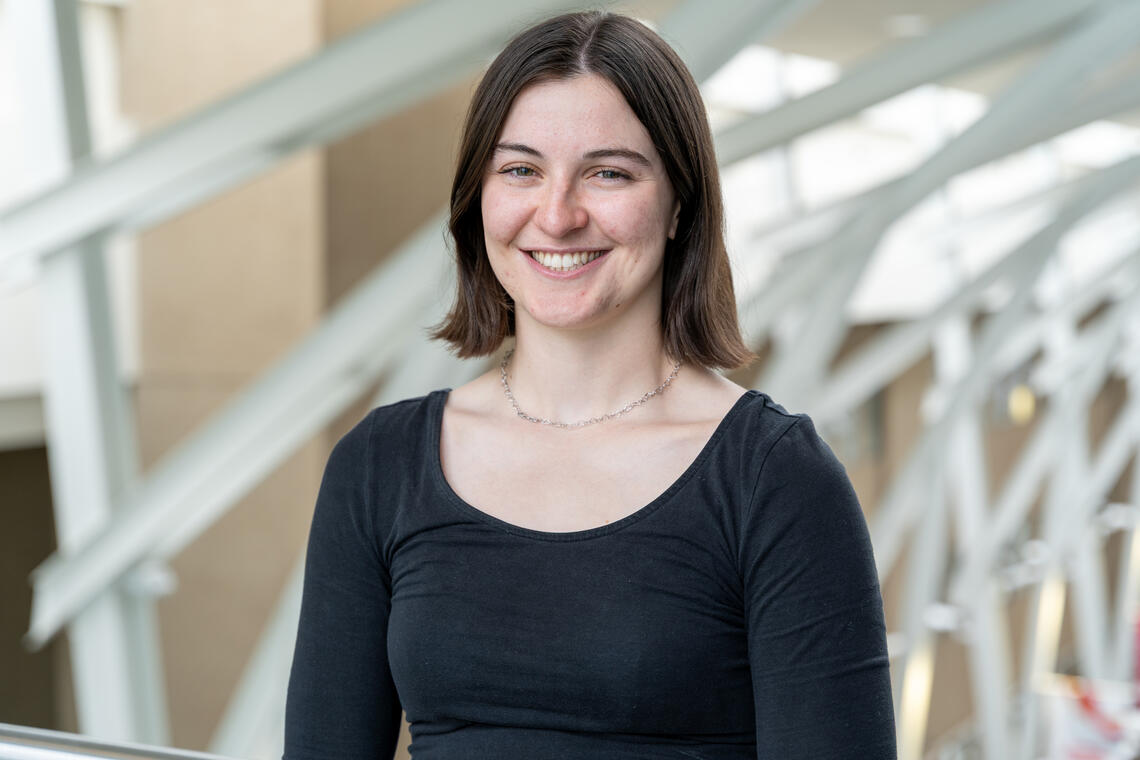
Anneke Korver
MSc Student
Supervisor: Dr. Arshad Ayyaz
Most human cancers exhibit drastic changes in the epigenetic landscape. This has led to the development of drugs that target epigenetic changes in cancers. These drugs have shown promising results in many types of cancer but have yet to be tested in colorectal cancer (CRC). 26,300 Canadians are diagnosed with colorectal cancer and 9,500 die from it every year making it a vital area of research. My project aims to test treatment combinations that specifically target the epigenetic pathway in a subtype of CRC that develops due to DNA methylation-induced gene silencing of key tumor-suppressor genes. I am culturing patient-derived organoids from samples of 10 human CRC patients to create a live CRC model in mice to test novel treatment options. I will compare tumor responses in mice treated with a combination of traditional chemotherapy and a novel epigenetic treatment to those receiving either chemotherapy alone or epigenetic treatments alone. We expect to see that combinatorial treatments will be more effective than either treatment alone. My project thus aims to expand treatment options for CRC, potentially paving the way for personalized medicine approaches. The use of organoids allows for the best possible recapitulation of the human tumor molecular makeup unique to patients with this subtype of CRC. Mouse models allow for an in vivo system that can represent the complexity of a whole organism's response to the presence of a tumor and subsequent treatment. The methodology of this study therefore gives the best chance of reproducibility of my results for clinical treatment for CRC in a promising area of cancer treatment.
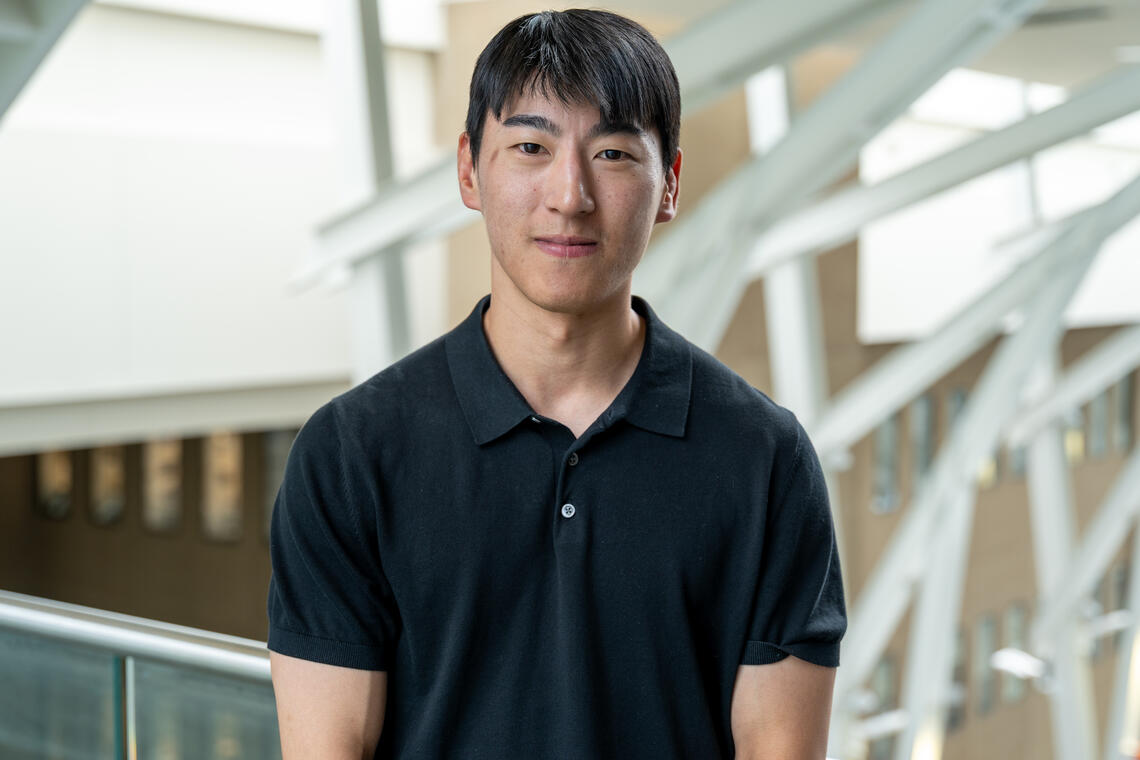
Heejae Lee
MSc Student
Supervisor: Dr. Jongbok Lee
Exercise to Enhance Cancer Immunotherapy for Acute Myeloid Leukemia
Acute myeloid leukemia (AML) is one of the most common forms of blood cancer in adults, with low 5-year survival rates of around 20%. Leveraging the immune system’s ability to target cancer cells, our research group has developed an innovative treatment strategy for AML called double-negative T (DNT) cell therapy. In this approach, a unique immune cell type known as DNT cells are extracted from healthy donors, ‘trained’ with anti-cancer activity, and infused into patients. A key factor for successful immune cell-based therapy is the health and fitness of immune cells used for patient treatment. Research has shown that exercise can enhance immune cell function conducive to greater anti-cancer activity and rejuvenate the immune system by replacing exhausted cells with fitter cells. Building on this knowledge, there is an opportunity to maximize the therapeutic potential of DNT cell therapy by exercising the donors prior to immune cell donation; however, the impact of exercise on DNT cell therapy has not been previously studied. This project aims to test the hypothesis that the immune benefits of exercise can be harnessed to enhance DNT cell therapy for AML. Based on maximal exercise testing, donors will be determined ‘trained’ (n=8) or ‘untrained’ (n=8) to investigate the role of physical fitness on the biology and therapeutic potential of DNT cells. Subsequently, the untrained donors will undergo a 6-week high-intensity interval training program to examine exercise-induced changes in the composition and anti-cancer activity of DNT cells before, during, and after the exercise intervention. With ongoing and planned clinical trials using DNT cell therapy for AML, the findings from this study will be swiftly translated into clinical practice to benefit the patients.
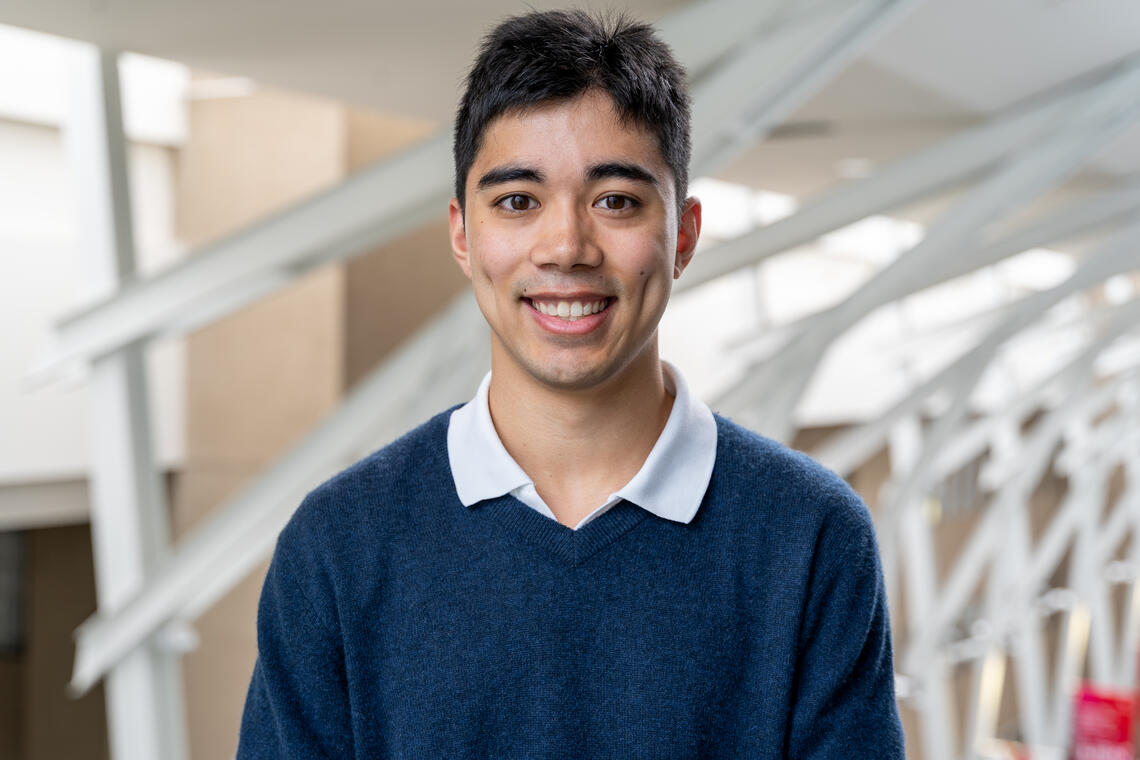
Taye Louie
MSc Student
Supervisor: Dr. Douglas Mahoney
Background: Alveolar soft part sarcoma (ASPS) is a highly metastatic cancer that is poorly managed by traditional treatment approaches. A new strategy known as chimeric antigen receptor (CAR) T cell therapy, where specialized killing cells of a patient immune system called T cells are engineered to selectively target their cancer, has proven effective. In a first-in-human trial, a CAR T therapy developed by our lab successfully eliminated many metastatic growths in a patient with ASPS; however, larger growths were non-responsive, likely due to activation of immune checkpoints by the cancer that suppress T cell activity. Further analysis of a non-responsive growth identified PDL1 as a highly expressed checkpoint protein, which sends inhibitory signals through interactions with its receptor, PD1, on T cells. Interestingly, atezolizumab, a PDL1 inhibitor, was recently approved for treating ASPS and may augment CAR T therapy.
Enhancing CAR T Therapy with atezolizumab: In an ASPS mouse model, my initial findings show improved anti-tumour activity using CAR T therapy in combination with atezolizumab. Since it is unclear how long after CAR T therapy atezolizumab treatment should begin, I will investigate and determine optimal atezolizumab dose timing.
Aim 2 - Armouring CAR T Therapy against the PD1/PDL1 inhibitory pathway: I will develop an enhanced version of our CAR T therapy by reducing its sensitivity to PD1/PDL1-mediated inhibition in the absence of atezolizumab. To do so, I will overexpress a non-functional PD1 receptor on CAR T cells that outcompetes and thus blocks functional PD1 from receiving inhibitory signals.
Significance: This research will provide strong insights into strategies for enhancing CAR T therapy through blockade of PD1/PDL1 signalling.
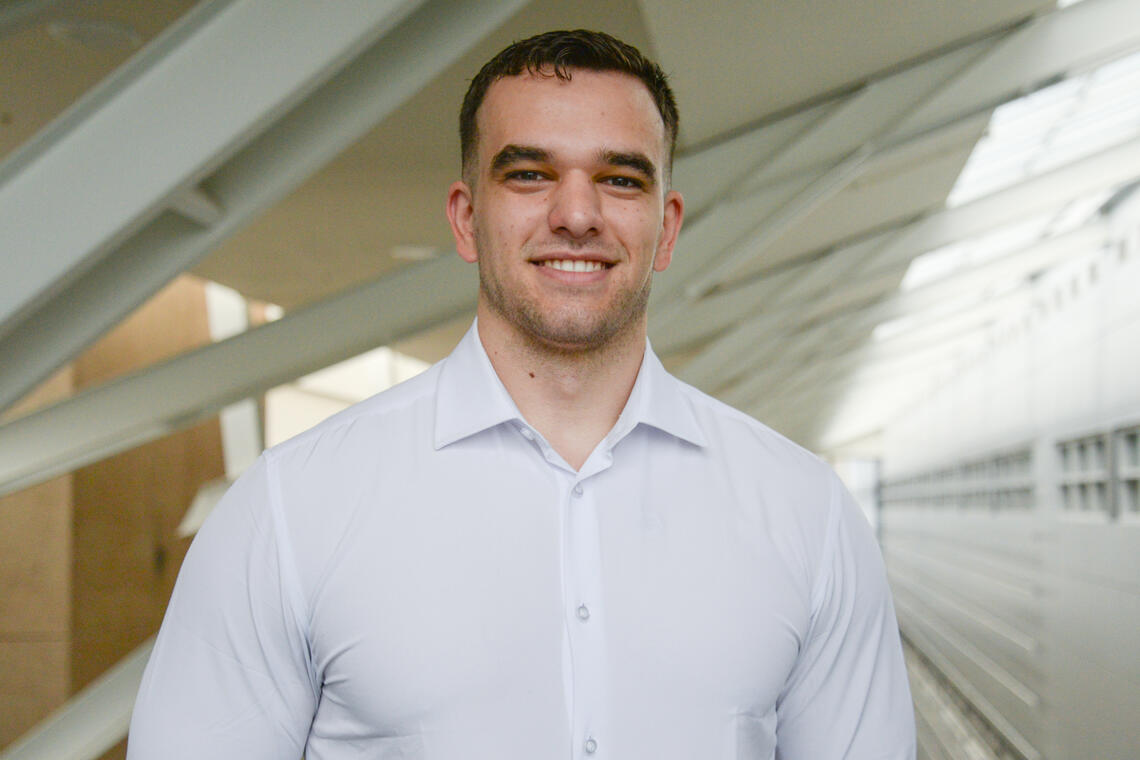
Logan Mahoney
MSc Student
Supervisor: Dr. Michael Monument
Harnessing Radiation Therapy to Overcome Resistance to Immunotherapy in Soft Tissue Sarcomas
This study investigates the potential synergy between radiation therapy (RT) and STING (Stimulator of Interferon Genes) agonists to overcome treatment resistance in soft tissue sarcomas (STS). STS are aggressive, immune-suppressive tumours with limited therapeutic options, characterized by poor response to immunotherapies and high relapse rates. The project aims to determine if combining RT with STING therapy can enhance tumour clearance in pre-clinical murine models, particularly in STING-resistant models like KPP1053.Our research will use immune-competent mice with two distinct sarcoma models: TAO1+, which is STING-permissive, and KPP1053, a STING-resistant line. Mice will receive various hypofractionated RT doses (8, 24, 40 Gy) to explore dose-dependent immune responses (spanning low-dose RT to high-dose RT). STING therapy will be delivered using agonist E7766, with detailed immune profiling and molecular analyses conducted to assess changes in immune cell populations, tumour microenvironment (TME) modulation, and survival outcomes. Key objectives include identifying optimal RT dosing, determining the ideal sequence for STING administration, and evaluating molecular markers of tumour immune response. This research aims to understand whether RT can reprogram a cold TME into a more immunogenic hot state, increasing the effectiveness of STING agonists and reducing tumour progression. Findings from this study will provide critical insights into novel combination strategies to improve therapeutic outcomes in STS, potentially transforming the treatment landscape for this challenging cancer. By advancing knowledge of tumour-immune dynamics, the project will seek to inform clinical strategies, improving survival and quality of life for sarcoma patients.

Cassie Wood
MSc Student
Supervisor: Dr. Johnathan Canton
Enhancing Dendritic Cell Cross-Presentation Through APOL7C for Cancer Immunotherapy
Our immune system is constantly protecting us from dangers like infections and cancer. A key player in this system is a type of immune cell called dendritic cells (DCs). These cells identify invaders, such as cancer cells, and trigger immune responses by presenting pieces of the invader to other immune cells, leading to their destruction. This process, known as cross-presentation (XP), is essential in fighting cancer. My research focuses on a specific protein called APOL7C, which is involved in enhancing XP. APOL7C helps DCs break down dangerous material, such as tumor cells, and show it to the immune system. However, the way APOL7C is recruited to where it is needed inside these cells is not fully understood. One important player in this process is a receptor called DNGR-1, which is located on the surface of DCs and helps detect cancer cells. Upon recognizing these dying cells, DNGR-1 may then help guide APOL7C to the right place inside the cell to enhance the immune response. By better understanding how this works, we hope to find new ways for the immune system to more effectively target and destroy cancer cells. This project aims to investigate (I) how DNGR-1 recruits APOL7C and (II) whether we can use this knowledge to create a new type of cancer therapy. We hope to engineer immune cells that are better equipped to detect and destroy cancer, potentially leading to more effective immunotherapies. My CIHR CGS will therefore have a significant impact on advancing our understanding of the immune system ability to target and eliminate cancer, offering a novel approach to cancer treatment by leveraging the body own immune system for a more precise and durable therapeutic response.


